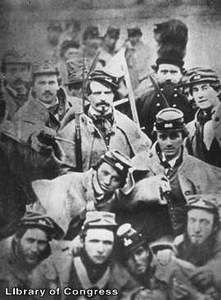 Baptist minister and soldier J. J. Hyman is serving as a chaplain in the 49th Georgia Regiment, a unit under the command of Confederate Gen. Thomas “Stonewall” Jackson. The troops have been in winter quarters for several months now, awaiting the battles that are to come in the spring. For chaplains, the temporary settling of soldiers in winter camp opens the door for much preaching and evangelism. Opportunities for recreation are limited, and revival services provide an occasion for soldiers to gather with their friends during these bleak months.
Baptist minister and soldier J. J. Hyman is serving as a chaplain in the 49th Georgia Regiment, a unit under the command of Confederate Gen. Thomas “Stonewall” Jackson. The troops have been in winter quarters for several months now, awaiting the battles that are to come in the spring. For chaplains, the temporary settling of soldiers in winter camp opens the door for much preaching and evangelism. Opportunities for recreation are limited, and revival services provide an occasion for soldiers to gather with their friends during these bleak months.
Revivals in Baptist life have long been multi-dimensional. While these special evangelistic services–typically held during the months of August, September or October–yield the bulk of new converts of a given congregation during the year, revivals are community events which, for many, are perceived primarily as an opportunity for fellowship and the renewing of friendships. Others value revival week as good entertainment (revival preachers have a reputation for antics and showmanship), while for young single adults the gatherings afford the opportunity to socialize (and sometimes flirt) with attractive persons of the opposite sex.
The war adds yet another dimension to this Baptist revival tradition. As the editors of Southern Baptist newspapers constantly remind their readers, Confederate soldiers are a sinful lot, ever prone to indulge in any of a host of evils that range from drunkenness to profanity, licentiousness, Sabbath-breaking, playing cards or partaking of other amusements, dancing when in town for the day, and other temptations. If God’s Confederacy is to win the war, the soldiers defending the nation must first accept Jesus and live virtuous lives. Baptist ministers are encouraged to serve as army missionaries and chaplains in the work of evangelizing the soldiers, of which revivals are a primary tool. Unfortunately, few respond to the call, as Southern Baptist leaders lament throughout the great conflict.
However, army camps represent the opportunity for revivals to be held year around, during the times when the army is not engaged in battle. In addition, the ever-looming specter of death preys upon the minds of soldiers, preparing the guardians of the South for revival messages in which the fires of hell are almost always vividly portrayed, contrasted with the joy and peacefulness of heaven for those who, though dying in battle, have accepted Jesus. Furthermore, with the assurance of the righteousness of killing the enemy in the name of God, and Jesus in their hearts during the heat of battle, Christian soldiers fight with the knowledge that death in service of the Confederacy is the pathway to a wonderful afterlife.
Nonetheless, up until now the war has not led to the anticipated religious awakening within the Confederate Army. Sin has been abundant, conversions relatively few, and revival services typically sparsely attended, to the disappointment of Southern Baptist leaders.
This month, however, J. J. Hyman senses the working of the Spirit in a new way, as he later recounts.
I left my home on the 10th day of March, 1862; joined the Forty-ninth Georgia Regiment as a private soldier on the 1st day of May. I was commissioned chaplain of the Forty-ninth Georgia Regiment. The battles around Richmond prevented us from having regular Divine service. After the battles were over, the Forty-ninth Georgia Regiment was attached to General J. R. Anderson’s Brigade, afterwards General E. L. Thomas’s. At this time I was the only chaplain in the brigade (four regiments). I, being young, knew but little about the duties of a chaplain, but was willing to do anything in my Master’s cause. Being in the command of General Jackson, we had but little time for religious service during the whole of 1862. On the 16th of December, 1862, we went into quarters at Camp Gregg, six miles south of Fredericksburg, Virginia, where I opened regular night service; sometimes in the open air, at other times (when weather was bad) in tents. Congregations were very good; often I have seen large numbers leave the door of the tent, being unable to get in, when the snow was all over the ground. Finding that we had gone into winter-quarters, I commenced preaching regularly three times a week to each regiment in the brigade. About the 1st of February, 1863, the good Lord poured out His Spirit upon us; hundreds were seeking the Lord for pardon of sins; almost daily there were some going down into the water, being buried with Christ in baptism.
Time will prove J. J. Hyman’s observations to be right: revival, finally, is truly breaking out within the ranks of Confederate soldiers.
Source: John William Jones, Christ in Camp: Or Religion in Lee’s Army, Richmond, Va.: B. F. Johnson, 1887, pp. 504-505 (link)


